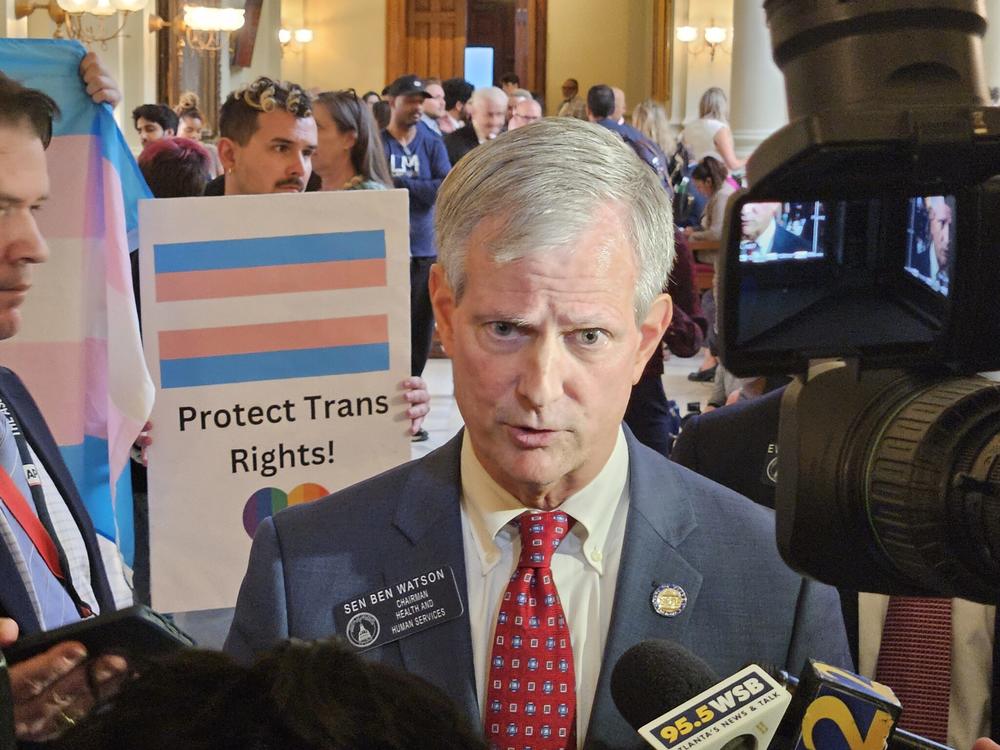
Caption
In this 2024 file photo, Sen. Ben Watson speaks to reporters about his bill banning puberty blockers from transgender minors.
Credit: Ross Williams/Georgia Recorder

In this 2024 file photo, Sen. Ben Watson speaks to reporters about his bill banning puberty blockers from transgender minors.
With all the hustle and bustle of the holidays and the preparation for the new year, many Georgians were not thinking about the state Legislature’s plans for when they meet up Jan. 13 for their annual lawmaking session.
But some trans Georgians and their allies did, said Jeff Graham, executive director of the LGBTQ advocacy group Georgia Equality, and they’re not looking forward to it.
“People are scared. People have been nervous, people have been sad, people have been upset about this, but I think we’re entering into a period where people are very afraid,” Graham said. “Parents are afraid of coming and sharing stories about their kids, that it could lead to further discrimination, it could target their kids, it could out their kids, so I am very concerned that they will be afraid to come down and share with their own elected representatives the stories of their families.”
Graham spoke with reporters in December after a Senate committee approved recommendations for legislation that would ban transgender girls from girls’ sports and locker rooms and potentially open up public and private schools to lawsuits or defunding if they do not comply.
The committee heard testimony from a group of top women’s swimmers who said they lost out on opportunities after being made to compete against and change alongside a transgender woman swimmer at a competition at Georgia Tech. Committee members say transgender women have an unfair advantage over cisgender women, especially if they underwent puberty as a male.
Transgender rights advocates largely say such cases are rare and should be resolved by athletic leagues rather than state governments, and that focusing on the niche issue sends a false message to transgender children that they deserve to be discriminated against.
Transgender people have unwittingly become a political flashpoint in recent years, including under Georgia’s Gold Dome, where lawmakers have passed or debated bills dealing with sports participation, school bathroom usage, hormone therapy for minors, books about LGBTQ subjects in school libraries, drag performances and more.
Cumming Republican Sen. Greg Dolezal, who chaired the committee on girl’s sports, told reporters to expect a bill tailored around sports competitions and locker rooms but added that he doesn’t know what other issues members of the General Assembly might want to tackle.
On the day the sports recommendations passed committee, influential conservative lobbying group Frontline president Cole Muzio put out an email promising to push for what he called “the world’s simplest bill.”
“In the State of Georgia, we will send a signal — loud and clear — that we will protect our girls. We will stand for truth, for fairness, and for what is right. Now is the time to take action. Join us.”
Frontline’s priority policy page contains several items transgender advocates say would be detrimental, including banning puberty blocking medications and codifying the sex in state law as unchangeable from birth.
Mikayla Arciaga, advocacy for the Intercultural Development Research Association education advocacy group, said it may be a challenge to police girls’ sports without touching other parts of the education system.
“You have to have enforcement guidelines, right? And so if we’re saying we’re going to restrict access to this space based on gender or sexual biology, that goes beyond a coach’s role,” she said. “Now you’re talking about school administration. There’s accountability levers that are at play there from like a coaching standpoint to an athletic director to the school. There’s issues of liability. Who’s enforcing this? At what level is it enforced? There’s (Family Educational Rights and Privacy Act) concerns.”
“I don’t know how they move forward on such a bill without including some of the other restrictions around gender expression and identity,” she added. “I think they are setting themselves up to ban any of it. And so I think it’s in their interest, unfortunately, to take a big swing at whatever they can get. I wouldn’t be surprised if we see them kind of spitballing and just seeing what sticks.”
Graham said the national environment on trans issues feels bleak for many Georgians aligned with LGBTQ people as president-elect Donald Trump prepares to take office and some Democrats question whether a perceived emphasis on trans issues on Democrats’ part helped cost them the election.
“This is an issue beyond just what’s happening here with the Legislature, to be honest with you.,” he said. “What happened this last year at the Legislature at times really disturbed me, but I really think it’s more of the national politics that the transgender community — there was $215 million that was spent in the last two months of this election cycle to spread misinformation and disinformation about the lives of transgender individuals. That much money spent spreading lies is going to have a an effect on people. And so I think that’s the environment that folks are reacting to much more than a specific environment here.”
But while Graham said the fear is real, he predicted next year’s session will also see transgender people and supporters come to the Capitol in force.
“There is also a great sense of resilience, specifically within the transgender community, of folks that are in a position to speak out, wanting to speak out like never before, wanting to share their stories, wanting the world to see their humanity,” he said.
This story comes to GPB through a reporting partnership with Georgia Recorder.